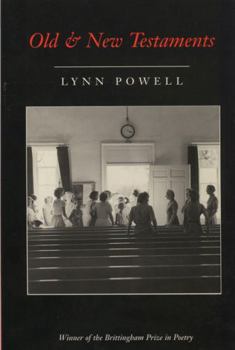Old and New Testaments: Volume 1995
Select Format
Select Condition 
Book Overview
These poems explore the author's Southern Baptist upbringing and how that history echoes through her adult experiences of sexual love, self-knowledge, loss and motherhood. Her testament is that of a... This description may be from another edition of this product.
Format:Paperback
Language:English
ISBN:0299149048
ISBN13:9780299149048
Release Date:October 1995
Publisher:University of Wisconsin Press
Length:82 Pages
Weight:0.35 lbs.
Dimensions:0.3" x 6.0" x 9.1"
Customer Reviews
2 ratings
Uplifting.
Published by Thriftbooks.com User , 20 years ago
Lynn Powell, Old and New Testaments (University of Wisconsin Press, 1995)Wow. This is some seriously fine stuff.Lynn Powell's first book of poetry (which won three awards, including the Norma Faber First Book Award) is a testament in every sense of the word. Don't bother trying to tell the Biblical literalists, however. Powell's volume focuses on the earthly, and how the spiritual relates to it; this is the kind of stuff capable of making a person understand how the physical and the spiritual are intertwined, not exclusive.The four parts of the book go through four aspects of life (birth, sensual awakening, marriage, and death), emphasizing the beauty and harmony of each, the spiritual aspect working with, but never dominating, the physical:"Oh God, keep me a mediocre Mary!Dilute my children's love with selfishness,let them refuse the treacherous kiss, never knowthe miserable cup. Make their lives long, happy, ordinary-and forgive the mother, reaching for Your hem, craving that miracle."("Raising Jesus")A wonderful book, highly recommended all around. ****
Intelligent, beautifully crafted; full of humor and passion
Published by Thriftbooks.com User , 27 years ago
When friends of mine were arguing recently about whether to raise their new baby with or without a conventional religious education, I gave them Lynn Powell's Old & New Testaments. In Powell's hands, the Bible stories and verses, mysteries and perils learned in childhood become a vital myth that colors and deepens almost every aspect of daily life, for both the child and the adult she becomes. One is tempted to conclude that the conditions of a Baptist upbringing are necessary and sufficient to make a poet-that this is the school all poets should go to. Of course, the material is well served by the observant imagination of the child Powell was and the keen intelligence, humor, and sure-footed craft of the adult poet who has clearly found her metier. Powell's book, winner of the 1995 Brittingham Prize in Poetry, is organized in four parts representing the Old and New Testaments of the title, but not in the expected order: Genesis, Song of Solomon, Revelation, and Job-the beginning, the idyllic time, the end, and finally, returning to the Old Testament's most timeless book, Job, the existential present. The poems range over childhood and family, illness and age, marriage and parenthood, love and marital conflict, with biblical and daily-life texts interwoven in the most natural and immediate way. At the outset, in "Nativity," we realize how compatible the Bible stories are with the domain of childhood and the imagination. The poem's structure (a sestina) reflects the interplay of contradictions and opposites, and their many mutations, that will continue throughout the book and that is inherent in the story of Jesus. It begins:Some parents shy away from the body,but we hush up about the cross-rereading our daughter the story about Jesuswe most believe in: motherand father kneeling after the hard birth,humbled by the exhaustions of love.In its alternations and ringing-of-changes on the six repeated words (most of which are different tones of the same, muted vowel), the unstrained sestina suits well the alternations of, and variations on, its ideas. The words Powell commits the poem to-body, cross, Jesus, mother, birth, love-prove up to the task, able to sustain the poem's progression of meaning. This is partly because she lets them assume many forms: As the narrative moves through the six stanzas, "birth" alternates with "death," "Jesus" with "Christ" and "God." "Mother" becomes "Mommy," and also the poet's mother to whom she whispered, "I think God would have picked me as Mother/Mary if he'd sent his son right now", and finally both "Mom" and the "Mary" whose part the child has taken. The cross takes on varied meanings, as an adjective (Herod, jealous and cross), and later, part of the sweet, vivid picture of the poet's baby son, enlisted as Jesus in his sister's play, "a prop, lovingly swaddled in blue dish towels, his head criss-crossed/with paisley scarves..."There are many more poems that deserve mention for the arresting pictures they paint,






